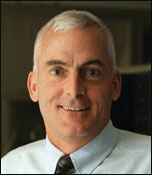Eugene LeBoeuf is the third Vanderbilt environmental engineering faculty member in two years to be accepted into the American Academy of Environmental Engineers and Scientists as a board certified environmental engineering member.

LeBoeuf, associate professor of civil and environmental engineering, received notification recently of his certification in environmental engineering.
He joins Steven L. Krahn, professor of the practice of nuclear environmental engineering, who was accepted into the academy in July and certified in the specialty practice of hazardous waste management, and James Clarke, professor of the practice of civil and environmental engineering, who received an inaugural environmental scientist certification in April 2012.
In December 2011, the American Academy of Environmental Engineers, which had been certifying environmental engineers since 1955, approved the separate and new environmental scientist certification and voted to change the Academy’s name to AAEES.
LeBoeuf’s research interests focus on developing improved methods to manage and increase sources of hydro-based renewable energy, and sustainable-energy water systems, including optimization of multi-reservoir hydropower systems. His current research projects are supported by the National Science Foundation and the U.S. Department of Energy.
He has participated in or led external technical reviews on nuclear waste remediation for the Department of Energy including a range of technology approaches to accelerate cleanup of contaminated areas in vicinity of the Columbia River at Hanford, Washington.
LeBoeuf, who joined the engineering faculty in 1997, is a fellow of the American Society of Civil Engineers. He is a colonel in the U.S. Army Reserve and he currently serves as the military chief, Emergency Operations Center, for the U.S. Army Corps of Engineers’ Pacific Ocean Division.
LeBoeuf received a bachelor’s degree with high honors in civil engineering from Rose-Hulman Institute of Technology, a master’s degree in industrial engineering and management science from Northwestern University, a master’s degree in civil engineering from Stanford University, and a doctoral degree in environmental engineering from the University of Michigan.
RELATED NEWS
Krahn receives U.S. academy’s environmental engineering certification
Clarke receives inaugural environmental scientist certification